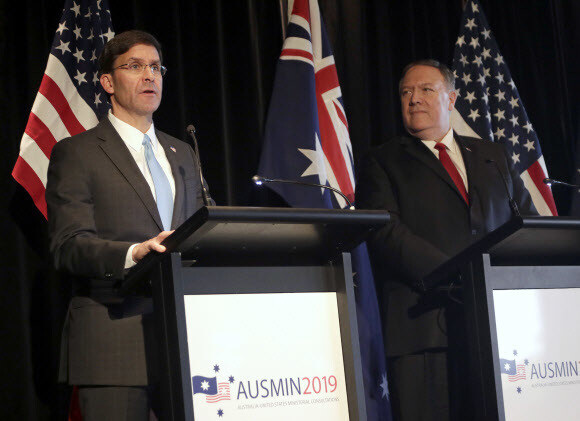hankyoreh
Links to other country sites 다른 나라 사이트 링크
[Editorial] Washington arrogantly pushes its interests with no concern for S. Korea’s difficulties

After pressuring South Korea not long ago to substantially increase its share of defense costs, the US is now effectively demanding that it send troops to the Strait of Hormuz and hinting at the possible deployment of intermediate-range missiles to South Korea. It is deeply saddening to see this attitude, which comes across as an attempt to exclusively push Washington’s interests with no concern for the difficulties we are now facing over the South Korea-Japan trade conflict.
Speaking on Aug. 4 in connection with the “Asian deployment” of intermediate-range missiles now that restraints have been removed following the US’ withdrawal from the Intermediate-Range Nuclear Forces (INF) Treaty, US Secretary of Defense Mark Esper indicated that the US would “deploy [missiles] in consultation with our allies and partners.”
The New York Times reported on the possibility of intermediate-range missiles being deployed in South Korea and Japan. If a South Korean deployment actually comes to pass, it is likely to stir up objections from China and lead to a second “THAAD episode.” It’s also clear that East Asia will be sent spiraling toward a deeply unstable and dangerous situation where the US, China, and Russia are all locked into an arms race with intermediate-range missiles.
Secretary of State Mike Pompeo also singled out South Korea and Japan while speaking on Aug. 4 in connection with forming a coalition to address maritime security in the Strait of Hormuz. “[I]t's very important that every country that has an interest in that region and has goods and services that flow – energy that flows into places like Japan and Korea – that they participate in a way that protects the interests of their own economies,” he said.
It is certainly true that the Strait of Hormuz is a lifeline, a place that roughly 80% of South Korea’s crude oil imports pass through, and that key South Korean economic interests hinge on safe passage there. But with the increased tensions there resulting from the US’ unilateral departure from its nuclear agreement with Iran, its rationale for demanding that other countries send troops is weak. White House National Security Adviser John Bolton also reportedly demanded that South Korea increase its share of defense costs to five times its current level while meeting with Blue House National Security Office Director Chung Eui-yong during his visit to South Korea last month. The Blue House has denied this, but did confirm that the issue of defense cost sharing was discussed. Far from mediating in the trade conflict between South Korea and Japan, the US is merely handing out a hefty bill for defense costs.
Matters like the deployment of intermediate-range missiles in Asia and the security of vessels in the Strait of Hormuz are part of the US’ global strategy, irrespective of whatever is going on between Seoul and Tokyo. But it’s troubling to see this disregard for the difficulties taking place within the alliance, and the exclusive focus on US gains. The demand that we raise our share of defense costs at the current time is particularly open to criticism over its one-sidedness. Shouldn’t our ally be helping in some small way to mitigate our conflict with Japan?
Please direct comments or questions to [english@hani.co.kr]

Editorial・opinion
![[Column] Has Korea, too, crossed the Rubicon on China? [Column] Has Korea, too, crossed the Rubicon on China?](https://flexible.img.hani.co.kr/flexible/normal/500/300/imgdb/original/2024/0419/9317135153409185.jpg) [Column] Has Korea, too, crossed the Rubicon on China?
[Column] Has Korea, too, crossed the Rubicon on China?![[Correspondent’s column] In Japan’s alliance with US, echoes of its past alliances with UK [Correspondent’s column] In Japan’s alliance with US, echoes of its past alliances with UK](https://flexible.img.hani.co.kr/flexible/normal/500/300/imgdb/original/2024/0419/2317135166563519.jpg) [Correspondent’s column] In Japan’s alliance with US, echoes of its past alliances with UK
[Correspondent’s column] In Japan’s alliance with US, echoes of its past alliances with UK- [Editorial] Does Yoon think the Korean public is wrong?
- [Editorial] As it bolsters its alliance with US, Japan must be accountable for past
- [Guest essay] Amending the Constitution is Yoon’s key to leaving office in public’s good graces
- [Editorial] 10 years on, lessons of Sewol tragedy must never be forgotten
- [Column] A death blow to Korea’s prosecutor politics
- [Correspondent’s column] The US and the end of Japanese pacifism
- [Guest essay] How Korea turned its trainee doctors into monsters
- [Guest essay] As someone who helped forge Seoul-Moscow ties, their status today troubles me
Most viewed articles
- 1[Column] The clock is ticking for Korea’s first lady
- 2Samsung barricades office as unionized workers strike for better conditions
- 3After 2 months of delayed, denied medical care, Koreans worry worst may be yet to come
- 4[Correspondent’s column] In Japan’s alliance with US, echoes of its past alliances with UK
- 5[Column] Has Korea, too, crossed the Rubicon on China?
- 6Hong Se-hwa, voice for tolerance whose memoir of exile touched a chord, dies at 76
- 7All eyes on Xiaomi after it pulls off EV that Apple couldn’t
- 8US overtakes China as Korea’s top export market, prompting trade sanction jitters
- 9[Photo] Smile ambassador, you’re on camera
- 10[Guest essay] How Korea turned its trainee doctors into monsters